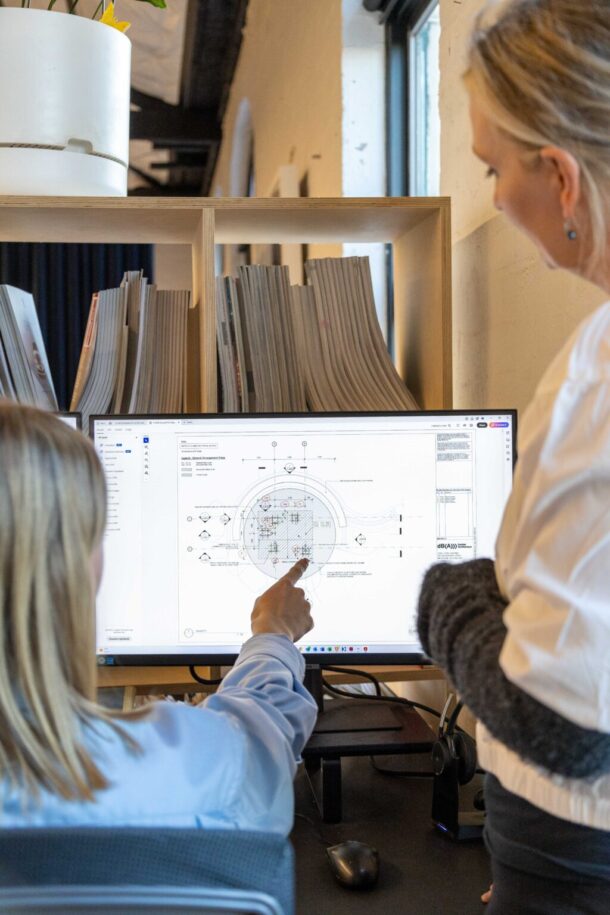In July 2024, Decibel Architecture launched a new Menstrual and Menopausal Wellbeing Policy, which aims to highlight and address inequity and to remove the stigma and taboo surrounding menstruation and menopause in the workplace. Strategy Director Stephanie Brady takes us through how it works, the outcomes and benefits, and the importance of progressive innovation at work.

Motivation
There has been quite a bit of talk about this type of policy in the media. I was curious and started researching. A comment by a friend also got me thinking. I had been talking to her about leave balances (as you do). She said to me, “What do you mean leave balances? I never have any leave balance – between school holidays, staying home to look after sick kids and managing severe monthly period symptoms, I only just get by and sometimes need to dip into my Annual Leave when I’m sick.”
This is telling. It’s the old equity vs equality trope. We began our deep dive.
Genesis
We first introduced the idea for the Menstrual and Menopausal Wellbeing Policy on International Women’s Day in March 2024 to start a conversation with our team. From there we had lots of discussions (individually and in groups), drafted many iterations of the policy, and conducted an internal survey that clarified where people needed more information and support.
This is now a permanent policy of Decibel Architecture. However, we do review all our policies annually and update them to reflect changes in Awards, legislation and general community vibe.
Blazing a trail
We know of government departments and larger corporates implementing similar policies both here and overseas but are not aware of any architectural practices (our size) who have implemented a similar policy. We are more than happy to blaze a trail here.
While I drove this policy, it’s only been successfully implemented due to the incredible support and input of my fellow dB(A) Directors (Dylan and Tristrim), our Finance Manager (Rachael), and our amazing team.
Aims
The main aim of this policy was to highlight and address inequity and to remove the stigma and taboo surrounding menstruation and menopause in the workplace. The symptoms can be debilitating, and they impact a lot of people. We wanted to acknowledge this and normalise these kinds of discussions.

How it works
We knew that our policy needed to be flexible, robust and no fuss, so we require no medical certificate, no qualifying period, and no advance notice of leave. Decibel offers those who experience symptoms of menstruation and menopause an additional six days of paid leave per calendar year to use as needed. Part-time employees are allocated days on a pro-rata basis. We also offer flexible work arrangements such as the option to work from home.
In a more formal capacity, we have a portal on our intranet where our team can provide feedback on anything at all, including this policy. At dB(A) we also have very open communication with our team, and these are generally conversations that happen in person, on the regular – something we very much encourage.
This policy is just a small step in the ongoing work that needs to be done to address gender inequity. It’s our responsibility as leaders to bring these issues to light, to make a compelling case for change and to persuade those who resist why these changes are important and necessary. Strong personal relationships and a robust team culture are vital to this kind of progressive innovation.”


Outcomes, benefits and feedback
It’s early days, but our team feel more confident to talk about menstruation and menopause openly – that’s powerful. Personally, I think it’s also a ‘peace of mind’ thing. Like our EAP, it’s another layer of support available to our team when it’s needed. Some people use it, some don’t – but it’s there. And I think that’s the most important thing.
This policy has been well received and celebrated by our team – they are rightly very proud of what they have achieved here. We have also had great feedback from the wider community supporting this policy and we hope that this inspires other practices to do something similar.
Ultimately, we made a policy that works for our team and our practice – the implementation itself was complex but achieveable. In our industry and beyond, there is still much work to do in this space, but never underestimate the value and impact of these small steps. We encourage other industry and practice leaders to start a conversation about this with their teams – if Decibel Architecture (a small-mid size practice) can make this happen, anyone can.”

Decibel Architecture (dB(A)) believes in challenging the status quo. Built on the foundations of studio505, Decibel began in 2015. The team sits at around 18–25 people (currently 21) and works from the heart of bustling Ngár-go (Fitzroy). Culture is everything and the Decibel team tends to this continuously, understanding innately that strong relationships are fundamental to the success of initiatives like the Menstruation and Menopause Wellbeing Policy. The practice values are Knowledge, Radicalism and Play – and these are taken very seriously. They hold deep meaning for the team and are threaded through the work and culture.




















